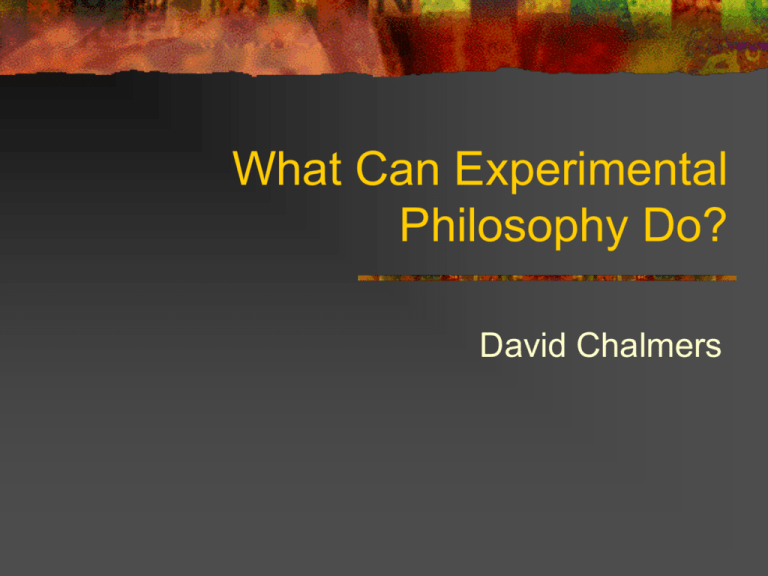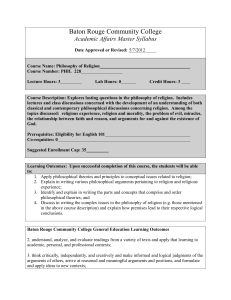What Can Experimental Philosophy Do?
advertisement

What Can Experimental Philosophy Do? David Chalmers Cast of Characters X-Phi: Experimental Philosophy E-Phi: Empirical Philosophy A-Phi: Armchair Philosophy Challenges to Experimental Philosophy Empirical results are irrelevant to philosophy X-Phi results are irrelevant to philosophy Existing X-Phi methodology is problematic Negative program doesn’t make its case The Positive Challenge What can experimental philosophy do to help discover first-order philosophical truths? about consciousness, knowledge, language, reality, free will, action, goodness, justice, … As opposed to criticizing existing philosophical methods and claims discovering higher-order truths about how we think and talk about philosophy Crude Critique X-Phi involves a Negative Program: Mainly critical “Positive” Program: Mainly lexicography Psychological Program: Mainly higher-order Where’s the positive beef? Armchairs on Fire? Another version: X-Phi wants to set armchairs on fire But armchairs are also its main object of study Philosophy as Garbage Dreben: Garbage is garbage, but the history of garbage is scholarship. X-Phi: Garbage is garbage, but surveys of garbage are science! Attitudes Nihilist X-phi: There are no first-order philosophical truths to discover Apathetic X-phi: I don’t care about philosophical truths, just about higher-order truths Scientistic X-phi: Replace armchair methods with empirical (but not x-phi) methods Imperialist X-Phi: X-Phi itself delivers first-order philosophical truths Refinement X-phi: X-phi refines, constrains, and extends armchair methods to help make them more effective Varieties of X-Phi The negative program: Studies disagreement and variation in philosophically important intuitions and judgments Potentially undermines parts of A-Phi The positive program: Studies patterns in the application of philosophically important concepts Potentially extends parts of A-Phi The psychological program: Studies the cognitive processes involves in philosophical judgment Potentially sheds light on parts of A-Phi Agenda 1. The positive program 2. The psychological program 3. The negative program 4. Conclusions 1. The Positive Program Positive X-Phi: Using survey methods to investigate patterns of application involving philosophically interesting concepts and judgments Intentional action (Knobe et al) Free will (Nichols et al) Genes (Griffiths/Stotz) Moral judgments (various) … Question Question: How different is the positive program from traditional conceptual analysis (and other A-Phi)? Some experimental metaphilosophy: Experiment “Frank is a philosopher. He ask himself whether a chairman who knowingly harms or helps the environment as a side effect harms or helps the environment intentionally. He judges that the answer is yes for harm, no for help. Frank concludes that morality is relevant to the concept of intentional action.” Questions Is Frank doing experimental philosophy? Is Frank doing conceptual analysis? Experiment “Jane is a philosopher. She questions one person in Washington Square Park about whether a chairman who knowingly harms or helps the environment as a side effect harms or helps the environment intentionally. The person answers yes for harm, no for help. Jane concludes that morality is relevant to the concept of intentional action.” Questions Is Jane doing experimental philosophy? Is Jane doing conceptual analysis? Experiment “Josh is a philosopher. He questions 30 people in Washington Square Park about whether a chairman who knowingly harms or helps the environment as a side effect harms or helps the environment intentionally. Most answer yes for harm, no for help. He concludes that morality is relevant to the concept of intentional action.” Questions Is Josh doing experimental philosophy? Is Josh doing conceptual analysis? Positive X-Phi as Conceptual Analysis Worry: The positive x-phi program is just conceptual analysis with n>1. The entire Knobe effect literature might have appeared in a book by Frances Kamm And: it suffers from most of the same limitations. Limitations of Conceptual Analysis Much conceptual analysis is dangerously close to lexicography It tells one about the meaning of our words and the content of our concepts These conclusions are of interest to the philosopher of language, but only tenuously of interest to others Worry: The same applies to positive x-phi Formal and Material Conceptual Analysis Formal conceptual analysis: Draws conclusions about application conditions in the formal mode ‘Bachelor’ refers to unmarried men Material conceptual analysis: Draws conclusions about application conditions in the material mode Something is a bachelor iff it is an unmarried man Formal conceptual analysis is empirical; material conceptual analysis is a priori [on the traditional picture]. Formal conceptual analysis concerns words; material conceptual analysis concerns the world. Armchair and X-Phi Analysis Armchair conceptual analysis is usually done in the material mode Conclusions about intentional action Armchair conceptual analysis can also be done in the formal mode Conclusions about ‘intentional action’ and intentional action Empirical conceptual analysis is usually done in the formal mode Q: Can empirical conceptual analysis be done in the material mode? Using X-Phi for Material Conceptual Analysis Can we use x-phi to show not just (2) follows from (1) given that (i) the people’s judgments are correct (ii) they are using the same concepts as us In many cases (i) and (ii) will be plausible, given that (1) Moral judgments are relevant to people’s judgments about whether an action is intentional; but also (2) Morality is relevant to whether an action is intentional? they are competent users of the terms we can debunk hypotheses about error and variation First-order philosophical truth from x-phi! Worries about Conceptual Analysis But: Even material conceptual analysis often reflects uninteresting truths about the contents of our concepts Discovering that (necessarily) bachelors are unmarried men isn’t more interesting than discovering that ‘bachelor’ means unmarried man If conceptual analysis tells me ‘free will is X1’ and tells you ‘free will is X2’, then the disagreement is arguably verbal (cf. Sosa on knowledge) Worry: Even material conceptual analysis doesn’t get at substantive philosophical truth. Can (positive) x-phi do better? Material Conclusion is Uninteresting? Cf: the material conclusion, “moral considerations are relevant to intentional action” is uninteresting because it simply reflects what we happen to pick out with the term “intentional action” We can address this by making the case that intentional action (so understood) has an important explanatory role. If someone has different intuitions about the cases, then we’d just be having a terminological dispute (cf. narrow conceptual analysis). If we can’t do this, the project is less interesting in any case. Non-verbal conclusion: There is an important feature of actions, crucial in explaining such-and-such, which is sensitive to moral considerations. There are two distinct important features (corresponding to “acting intentionally”, “acting with an intention”) where we might have thought there was just one. … Narrow and Broad Conceptual Analysis Narrow conceptual analysis: Analyzes application conditions grounded wholly in conceptual competence. Broad conceptual analysis: Analyzes application conditions grounded partly in substantive reasoning and judgment E.g. normative analysis: Analyzes conditions of application of normative concepts such as good, right, rational. Also: some modal, logical, mental analysis? Cf. Semantic vs substantive intuitions Narrow and Broad Conceptual Analysis Arguably: The lexicographic critique applies more directly to narrow conceptual analysis than to broad conceptual analysis Diagnoses of verbal difference are less plausible in normative analysis Broad conceptual analysis is only tenuously conceptual analysis The interesting work is done by the substantive reasoning/judgment So: perhaps positive normative x-phi, and other sorts of positive broad analysis, can help deliver substantive first-order truths? But still: it’s doing the same sort of thing that can be done from the armchair. Positive X-Phi Positive X-Phi is arguably continuous with traditional conceptual analysis Versions of its conclusions could have been reached via armchair philosophy Advantages of Positive X-Phi? Q: What does positive x-phi offer us that traditional armchair analysis does not? Greater systematicity of investigation? Automatic crossvalidation of data? Avoidance of theoretical corruption of data? Discovery of surprising regularities? Focus on psychological mechanisms? Continuity with social psychology? Advantages of Armchair Analysis? Q: What does traditional conceptual analysis offer us that experimental philosophy does not? More ideal reflection? Easier critical scrutiny of judgments? Quickness and cheapness? Conclusions in material mode, not formal mode? Continuity I think: Positive experimental philosophy is itself a form of conceptual analysis Performed in the third person rather than the first person With n > 1 Somewhat less idealized/reflective Initially in the formal mode More quantitative and systematic, less subjective But the two are very much continuous, and have similar strengths and limitations as a guide to philosophical truth Positive X-phi as refined/extended A-phi? 2. The Psychological Program Use experimental methods to investigate the cognitive processes involved in philosophical judgments, in ordinary subjects and in philosophers. Knobe, Greene, Lombrozo, … Most work in the positive (and negative) program can also be construed as contributing to the psychological program Much work in cognitive/social/developmental psychology (on causation, theory of mind, objects, numbers, fiction, moral reasoning, counterfactual reasoning, …) The Psychology of Philosophy We can think of this as the psychology of philosophy (psi-phi? psy-phi?) Construed broadly to include the sociology, anthropology, linguistics, neuroscience of philosophy A project pursued piecemeal by many (most?) philosophers over the years But now studied empirically, systematically, rigorously Contribution of Psy-Phi I think: the psychological program is the most important and distinctive positive contribution of x-phi The psychology of philosophy is an interesting and important part of both psychology and philosophy Still: it most obviously gets at higher-order truths about philosophical reasoning, not at first-order truths Psy-Phi and First-Order Truths Q: How can psychology of philosophy help us get at first-order truths? Via the positive program in material mode By investigating conditions under which philosophical judgments are reliable By empirically testing psychological claims made by philosophers, e.g. in explaining/explaining away philosophical judgments Others? Is Psy-Phi a Natural Kind? Q: Is psychology of philosophy a unified field, or many subfields? I.e. are there general truths here, or just local results concerning judgments about morality, causation, mind, existence? What might general results be? Dynamics of intuition and reflective judgment? General conditions for convergence of intuitions? Conditions for optimal philosophizing? Psy-Phi and A-Phi Overall: Psy-Phi is (i) an interesting project in its own right, for discovering higherorder truths (ii) Not a direct guide to first-order philosophical truth (iii) But potentially a useful indirect constraint on traditional philosophizing Can be combined with nihilist, apathetic, scientistic x-phi, but most useful as refinement x-phi. 3. The Negative Program Negative X-phi: Investigates disagreement (especially crosscultural) in philosophically relevant intuitions and judgments Stich, Weinberg, Nichols, Mallon, Machery, … Potentially undermines aspects of traditional philosophy Sometimes a philosophical thesis E.g. moral realism Sometimes a philosophical method E.g. intuition-driven epistemology, theory of reference Responses Possible responses from a traditional philosopher 1. Question experimental design 2. Appeal to idealization 3. Appeal to verbal differences 4. Embrace anti-realism, relativism, locality. The Appeal to Idealization Idealization: Distinguish prima facie judgments fron idealized (maximally reflective) judgments, and hold that the latter are what matter philosophically. Though: In some cases, it looks like prima facie judgments are doing philosophical work, and survive reflection. And: “idealized” judgments in professional philosophers may involve theoretical corruption Can We Test for Idealization Experimentally? Can we test for idealized reasoning experimentally? Cf. Cognitive reflection test Other tests for philosophical reflectiveness? If crosscultural disagreements persist in more ideal subjects, then the idealization response is weakened and the evidence of negative x-phi correspondingly stronger. If crosscultural disagreements disappear or diminish in more ideal subjects, then the idealization response is strengthened and the evidence of negative x-phi weaker. Suggestion: something like this should become standard in negative x-phi studies? The Appeal to Conceptual Difference Conceptual difference: The subjects who (apparently) disagree are using different concepts So they don’t really disagree, and both may be correct E.g. knowledge, good, causation… Plausibility Worry: Sometimes this move seems more plausible than others For disputes about what falls under ‘chair’, plausible. For disputes about what falls under ‘right’, less plausible. Q: Which cases fall on which side? For disagreements over narrow conceptual analysis, the move is often plausible. So negative x-phi doesn’t really target narrow conceptual analysis. For disagreements over in normative analysis (concerning what one ought to do or believe), the move seems less plausible. But even for intuitively normative terms (e.g. knowledge), it’s not obvious that disputes ramify into “ought”-disputes Can We Test for Conceptual Difference Experimentally? Can we test for conceptual difference experimentally? If so, we can use this method to help resolve the issue.. But it’s not obvious that this is possible, or tractable: perhaps diagnosing conceptual difference will always involve the use of quasi-philosophical judgment And even if it is possible, our tests for conceptual difference will probably presuppose some substantive (a priori?) philosophy. So traditional philosophy may be essentially required here. What is the Scope of Negative XPhi? How much a priori/armchair philosophy does negative x-phi potentially undermine? So far: Some specific theses (moral realism) Some specific intuitions (Gettier and Kripke) and the resulting conclusions Potentially: A subset of intuition-based philosophy? All intuition-based philosophy? A priori/armchair philosophy more generally? Whither Armchair Philosophy? Does negative x-phi potentially undermine armchair: Interpretation of probability? Decision theory? Semantic theory? Normative/applied ethics? Metaphysics of supervenience, modality, physicalism? Metaphysics of objects? Philosophy of skepticism? Aesthetics? Much a-phi doesn’t obviously rely on intuitions At least, not more than empirical philosophy does. Even in intuition-involving philosophy, intuition is often the first word rather than the last, with arguments, costs/benefits, theoretical utility playing key roles. Negative X-Phi as Tool for A-Phi I think: negative x-phi will end up as a useful tool for refining and constraining a-phi Helping distinguish cases where intuition is useful from those where it isn’t Results of local relevance, bearing on various specific debates (with philosophers disagreeing about which) But the import will only be assessable in conjunction with a lot of a-phi at the same time Both to interpret the relevance of experimental data And to weigh along with the evidential weight of other reasoning. 4. Concluding Issues Say that x-phi is widely successful in undermining traditional armchair philosophy. What does it offer instead, in discovering first-order philosophical truths? Reject the questions? Positive X-Phi Ostrich-like Limited Empirical philosophy? E-Phi as a Replacement for APhi? One view: X-Phi undermines A-Phi and E-Phi replaces it. But: Recent philosophy teaches us that while E-Phi is valuable, it requires much A-Phi along the way To bridge the gap between empirical data and philosophical conclusions E-Phi arguments usually have whopping A-Phi premises This is all the more so for E-Phi addressed at the big (first-order philosophical) questions about consciousness, free will, knowledge, morality, … So E-Phi can’t do without A-Phi X-Phi as an Enhancement for APhi I see X-Phi as a very useful tool for enhancing and sharpening existing philosophical methods Alongside other tools -- e.g. formal epistemology, semantic analysis (It’s also important as psychology of philosophy, and as a stimulus to metaphilosophy.) Various roles for it to play: How Might X-Phi and A-Phi Combine? Q: How can experimental philosophy and armchair philosophy constructively combine to yield philosophical conclusions? Experimental development of conceptual analysis Experimental checks on philosophical intuitions Experimental investigation of philosophers’ empirical claims Armchair interpretation of experimental data Idealized assessment/systematization of intuitive data Armchair philosophy in designing experimental tests Whither the Burning Armchair? Q: How does X-Phi help discover first-order philosophical truths? A: By constraining and extending traditional philosophical methods. So don’t burn the armchairs! Replace the burning armchair with The extended armchair (positive x-phi) The constrained armchair (negative x-phi) The examined armchair (psy-phi) Conclusion X-Phi without A-Phi is empty A-Phi without X-Phi is shortsighted








